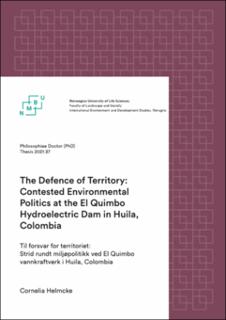| dc.contributor.advisor | Leifsen, Esben | |
| dc.contributor.advisor | McNeish, John Andrew | |
| dc.contributor.author | Helmcke, Cornelia | |
| dc.coverage.spatial | Colombia, Huila | en_US |
| dc.date.accessioned | 2021-06-24T09:43:45Z | |
| dc.date.available | 2021-06-24T09:43:45Z | |
| dc.date.issued | 2021 | |
| dc.identifier.isbn | 978-82-575-1736-6 | |
| dc.identifier.issn | 1894-6402 | |
| dc.identifier.uri | https://hdl.handle.net/11250/2761077 | |
| dc.description.abstract | This dissertation examines the environmental struggle caused by a large-scale dam project in Huila province, Colombia, and the politics that allowed the controversial hydroelectric power plant “El Quimbo” to start operating in 2015. Through examining different truth regimes around the environmental impacts, the thesis provides a nuanced understanding of the profound differences between conventional apolitical economic and ecological framings of versus political ecology approaches to such investments. It seeks to understand how related politics across temporal and spatial scales structured the possible fields of action of the affected population. More specifically, it analyses how spaces of contestation are opened or closed through the production of knowledge of place, the reconfiguration of space and infrastructure, the distribution of discourses and narratives, the enactment of networks across scales, as well as of democratic control mechanisms. With this, the study contributes to the conceptualisation of aspects of power within political ecology. | en_US |
| dc.description.abstract | Denne avhandlingen undersøker en miljøkonflikt forårsaket av et storskala damprosjekt i Huila-provinsen, Colombia, og politikken som muliggjorde igangsettelsen av det kontroversielle vannkraftverket “El Quimbo” i 2015. Gjennom en studie av forskjellige sannhetsregimer rundt miljøkonsekvenser, gir avhandlingen nyansert innsikt i de dype forskjellene mellom konvensjonelle apolitiske økonomiske og økologiske rammer for forståelse, versus politisk økologiske tilnærminger til slike investeringer. Studien søker å forstå hvordan politikk utført over tid og i ulike kontekster strukturerte de mulige handlingsfeltene til den berørte befolkningen. Mer spesifikt analyserer den hvordan kontroversielle handlingsrom åpnes eller lukkes gjennom produksjon av kunnskap om sted, rekonfigurering av rom og infrastruktur, distribusjon av diskurser og fortellinger, dannelse av nettverk “mellom skalaer”, samt gjennom demokratiske kontrollmekanismer. Med dette bidrar studien til en begrepsfesting av maktaspekter innen politisk økologi. | en_US |
| dc.language.iso | eng | en_US |
| dc.publisher | Norwegian University of Life Sciences, Ås | en_US |
| dc.relation.ispartofseries | PhD Thesis;2021:37 | |
| dc.rights | Attribution-NonCommercial-NoDerivatives 4.0 Internasjonal | * |
| dc.rights.uri | http://creativecommons.org/licenses/by-nc-nd/4.0/deed.no | * |
| dc.subject | Political ecology | en_US |
| dc.subject | hydroelectricity | en_US |
| dc.subject | Colombia | en_US |
| dc.subject | environmental conflicts | en_US |
| dc.subject | extractivism | en_US |
| dc.subject | green energy | en_US |
| dc.subject | Latin America | en_US |
| dc.subject | dams | en_US |
| dc.title | The defence of territory : contested environmental politics at the El Quimbo hydroelectric dam in Huila, Colombia | en_US |
| dc.title.alternative | Til forsvar for territoriet : strid rundt miljøpolitikk ved El Quimbo vannkraftverk i Huila, Colombia | en_US |
| dc.type | Doctoral thesis | en_US |
| dc.description.version | publishedVersion | en_US |
| dc.subject.nsi | VDP::Social science: 200 | en_US |

